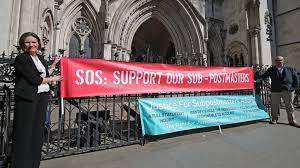- X marks the spot again - 17th February 2026
- Wordy again part three - 16th February 2026
- ‘Lies, damned lies etc…’ - 13th February 2026

The revelation of a multi-million pound compensation order after hundreds of sub-postmasters and mistresses were wrongly pursued through the courts by the Post Office (PO) in the biggest miscarriage of justice in British legal history, shines the spotlight once more on the vital Welsh aspects of the scandal.
A key player at the PO, was Angela van den Bogerd, whose appointment as ‘Head of People’ at the Football Association of Wales (FAW), led to the abrupt departure of the organisation’s contentious chief, Jonathan Ford, who left last year after losing a vote of no-confidence, following an astonishing civil war inside the organisation, which has never been fully explained by the mainstream media.

Ms van den Bogerd was an integral part of the PO’s complaints and mediation scheme, and in 2015 she appeared before MPs at a parliamentary select committee inquiry into the computer system at the centre of it all. She has also co-authored at least one internal PO report on its relationship between sub-postmasters and mistresses, and that system, while in 2018 she was made ‘Business Improvement Director’.
One former postmistress, Seema Misra, spent four months in jail, before she was completely exonerated. She was one of more than 700 people who were wrongly accused of stealing money, with 165 going to prison, and the controversy has been blamed for causing at least four suicides.

The Eye’s disclosure of crucial facts like these, came amid news that one sub-postmaster who lived between Swansea and Merthyr Tydfil explained how he (along with others) had tried to take his own life, while another Welshman talked about his marriage going on the rocks, in the years after the IT glitch, which led to them both being falsely accused of pilfering cash.
Last month the Postal Services Minister Paul Scully MP unveiled a further £19.5 million in compensation, taking the total amount of public money paid out to around £30 million.

Mr Scully declared: “I hope this will go some way, in helping many postmasters who have, and still are, facing hardships”.
His admission of more public cash having to be handed out, was made after we divulged how Ms van den Bogerd had been a PO director, before she was made a senior executive at the FAW, despite the fact that she had been found by a judge earlier to have “obfuscated” and “misled” a court.
Ms van den Bogerd has now departed the FAW, too. However these details have highlighted victims of the scandal telling their side of the story.


Mark Kelly, for example, who ran the Brondeg Post Office, from 2003 until 2006, has described publicly the terrible impact on him, of the wrongful accusation from the PO that he had stolen money. He said that it had “made me feel guilty and depressed, over the years, I started then to blame myself and I tried to end my life a few times”.
But Mr Kelly is not alone in having these suicidal thoughts because of the incorrect allegation.
Another former PO worker, Jennifer O’Dell, said she had also considered killing herself and suffered from recurring night terrors. She had been wrongly accused of stealing almost £10,000 from a post office in Cambridgeshire.

Speaking at the end of the first week of an independent inquiry into what happened, Ms O’Dell said she had researched how to take her own life, as well as suffered from depression and Post-Traumatic Stress Disorder (PTSD).
She told how she “went to some very dark places, extremely dark places. I even worked out how to commit suicide. I had to have anti-depressants. I had to have sleeping pills. I had night terrors where my husband had to wake me up. And it wasn’t just once every so often, it was two or three times a week. I had high blood pressure as well”.

In the Autumn, the inquiry (led by retired Welsh judge Sir Wyn Williams) will hear evidence about the design of the defective Horizon IT system which made the mistakes, and from December it will hear about the failings in the investigation.
The system’s aim was to replace paper in the network of 17,000 branches – however soon after it was rolled out, shortfalls began to appear, often of several thousand pounds.
Horizon was supplied by the giant Japanese company Fujitsu, but in all there were 736 unsafe convictions for theft, fraud and false accounting.

Paula Vennells, who was Chief Executive Officer (CEO) of the PO from 2012 to 2019, put the blame squarely on Fujitsu.
Officials at the PO, meanwhile, have said they are “sincerely sorry” for the way that victims and their families had been affected.
Mr Kelly, who was one of those accused between 2000 and 2014, said: “I can’t really socialise as much as I used to and I can’t actually manage some tasks – I can’t handle stress”.

He has described how he went to senior managers at the organisation, believing he had worked out how the errors were happening, but he said the company “didn’t want to know” and wanted to “bury it”.


Problems within the PO’s computer system, meant it looked like money was missing from branches when it wasn’t.
Mr Kelly was threatened with prosecution for theft and false accounting. His wife too was leant on, because she also worked at the branch.
He eventually resigned, losing the business and then his house, and it meant he and his wife decided not to start a family. He proclaimed: “We originally hoped to keep the office going and we would start a family – it was a four-bedroom house. But after the breakdown, we lost the house from it all, we thought we couldn’t have a family ’cause we had no house and no stability”.

Explaining how he was held under the Mental Health Act for six months when the PO tried to carry out their first interview with him, Mr Kelly said he “completely blanked out” and his solicitor said the interview should stop.
He also said: “I am very anxious now. I get stressed quite easily. I’ve got PTSD and I keep on thinking that I caused a lot of these problems for other people“. I became quite suicidal and I did try to do it. But then I heard on the radio about the High Court hearing and that was when I understood that I wasn’t at fault, but for years I carried that it was my fault”.

Mr Kelly, who now runs a mobile phone repair and accessory shop in Neath Market, hopes his story will “help everyone”.
A further victim of the PO’s tactics, Tim Brentnall, from Roch in Pembrokeshire, said the scandal led to the breakdown of his marriage because of “trust issues”, and he was prosecuted in 2010 after a £22,000 ‘shortfall’ was discovered at his branch, but his conviction was overturned.

Mr Brentnall has told how his sister, who ran a local hotel at the time, was also affected because “people tarred her with the same brush”. And he said in the years that followed his conviction, there was a “whispering campaign”, in the community with people calling him a “thief” and a “fraudster”.
Following the overturning of his convictions, he is now working in the Roch shop again, but said the business would never recover financially with its turnover down from £500,000 to £100,000.

“I hate the Post Office”, he said. “It’s hard to hate an organisation but I still have really bitter feelings towards the people who investigated us, prosecuted us and perpetuated this lie. When I was interviewed, they told me I was the only person having trouble with the Horizon, they must have told that to numerous people. How they can live with themselves is beyond me.”

In addition to apologising, the PO stated: “In addressing the past, our first priority is that full, fair and final compensation is provided and we are making good progress”.
It may not sound like ‘good progress’ to all those who have considered taking their own lives, and seen their marriages fall apart, when they know how a “full, fair and final compensation” package has been offered for what happened to them.
But at least it puts centre stage the role of people in Wales…

Our Editor Phil Parry’s memories of his remarkable decades long award-winning career in journalism as he was gripped by the incurable neurological disabling condition Hereditary Spastic Paraplegia (HSP), have been released in a major book (including looking behind the headlines of important football events) ‘A GOOD STORY’. Order the book now!
Regrettably publication of another book, however, was refused, because it was to have included names.









